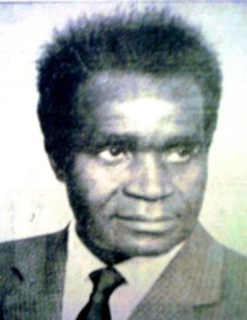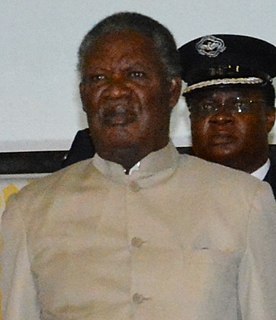Related Research Articles

The United Party for National Development (UPND) is a social liberal political party in Zambia, led by Hakainde Hichilema, the current president of the country. The party is an observer member of the Africa Liberal Network.

The United National Independence Party (UNIP) is a political party in Zambia. It governed the country from 1964 to 1991 under the socialist presidency of Kenneth Kaunda, and which was the sole legal party between 1973 and 1990. On 4 April 2021, Bishop Trevor Mwamba was elected President of UNIP.

The Forum for Democracy and Development (FDD) is a political party in Zambia.

The New Heritage Party, former Heritage Party, is a political party in Zambia.

The National Citizens' Coalition (NCC) was a minor political party in Zambia.

The Patriotic Front (PF) is a social democratic political party in Zambia. The party was formed by Michael Sata as a breakaway party of the Movement for Multiparty Democracy (MMD) in 2001 after the President Frederick Chiluba nominated Levy Mwanawasa as its presidential candidate for 2001 elections. The party's main base of support are usually the youth and poor people in urban centres, as well as members of the Bemba people in Copperbelt Province and Lusaka Province.

The Zambia Republican Party is a political party in Zambia.

Hakainde Hichilema is a Zambian businessman and politician who is the seventh and current president of Zambia since 24 August 2021. After having contested five previous elections in 2006, 2008, 2011, 2015 and 2016, he won the 2021 presidential election with over 59% of the vote. He has led the United Party for National Development since 2006.

Rupiah Bwezani Banda is a Zambian politician who was the fourth president of Zambia from 2008 to 2011.

The United Democratic Alliance (UDA) was a political alliance in Zambia formed to contest the 2006 general elections.

The vice-president of Zambia is the second highest position in the executive branch of the Republic of Zambia. The vice-president was previously appointed by the President before the amendment of the Constitution in 2016. Under the amended Constitution, when the president dies, resigns or is removed from office, the vice-president automatically assumes the presidency, unlike when the Constitution demanded holding of presidential by-election within 90 days. This is so because now every presidential candidate shall pick a vice-presidential running mate and the two will share the vote meaning voting for a president is an automatic vote for the vice-president.
Tilyenji Kaunda is a Zambian politician. Until 5 April 2021 he served as leader of the United National Independence Party (UNIP)

General elections were held in Zambia on 19 December 1968 to elect the National Assembly and President. The first post-independence polls saw incumbent Kenneth Kaunda retain his post as president, whilst his United National Independence Party, the only party to field candidates in all 105 constituencies, won 81 of the 105 seats in the National Assembly. Voter turnout was 82.5% in the parliamentary election, but 87.1% in the presidential election.

General elections were held in Zambia on 5 December 1973. They were the first elections held since the country was formally declared a one-party state in August, with the United National Independence Party (UNIP) as the only legally permitted party. UNIP leader Kenneth Kaunda was automatically elected to a third five-year term as President, and was confirmed in office via a referendum in which 88.8% of voters approved his candidacy. UNIP also won all 125 seats in the National Assembly. Voter turnout was 39% of the 1,746,107 registered voters for the presidential election, and 33% for the National Assembly election.

The National Restoration Party (NAREP) is a political party in Zambia.

General elections were held in Zambia on 20 September 2011, electing a President and members of the National Assembly. Michael Sata of the Patriotic Front (PF) won the presidential elections, defeating incumbent Rupiah Banda of the Movement for Multi-Party Democracy (MMD), and was sworn into office on 23 September. The PF emerged as the largest party in the National Assembly, winning 60 of the 148 seats decided on election day.

Presidential elections were held in Zambia on 20 January 2015 to elect a president to serve the remainder of the term of President Michael Sata, following his death on 28 October 2014.

General elections were held in Zambia on 11 August 2016 to elect the President and National Assembly. A constitutional referendum was held alongside the elections, with proposals to amend the bill of rights and Article 79.

The National Party is a political party in Zambia.

The Agenda for Zambia (AZ) was a political party in Zambia active between 1996 and 2002. The party was associated with Akashambatwa Mbikusita-Lewanika and his sister Inonge Mbikusita-Lewanika, and drew most of its support from Western Province.
References
- ↑ New political party formed Lusaka Times, 23 June 2009